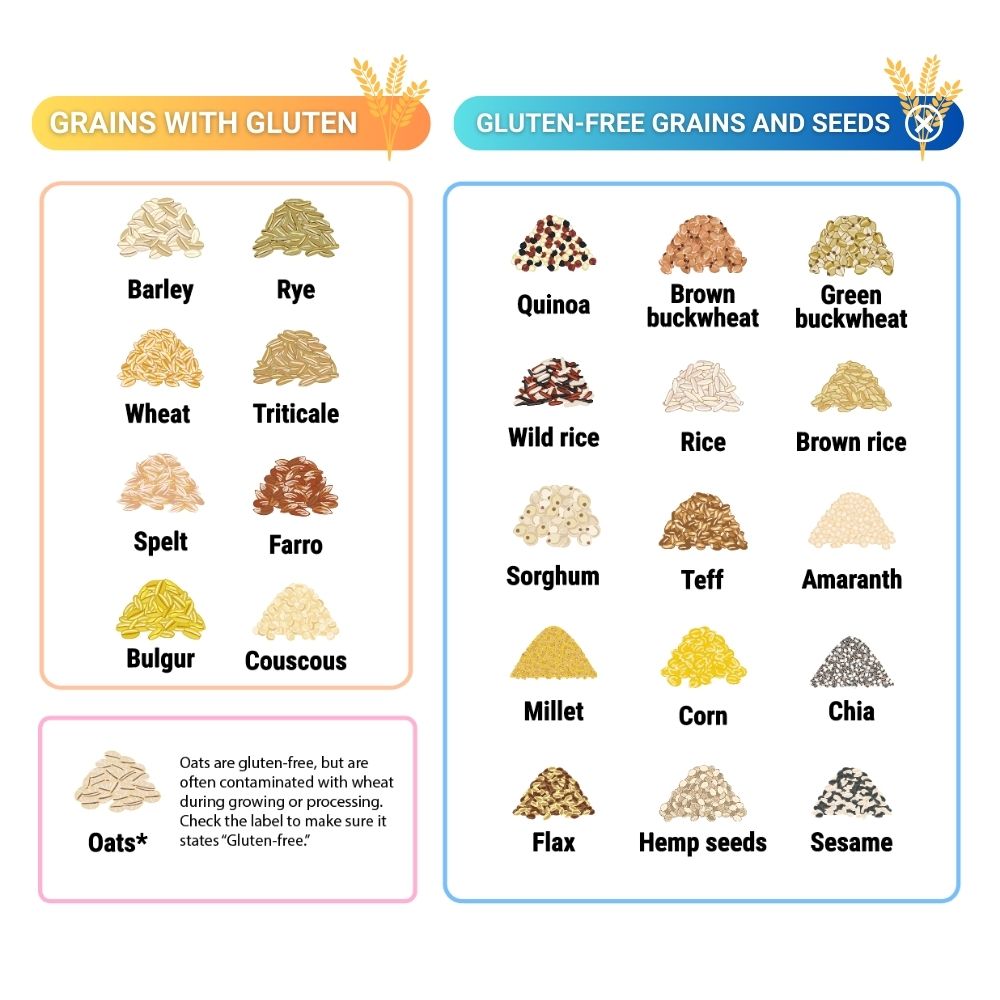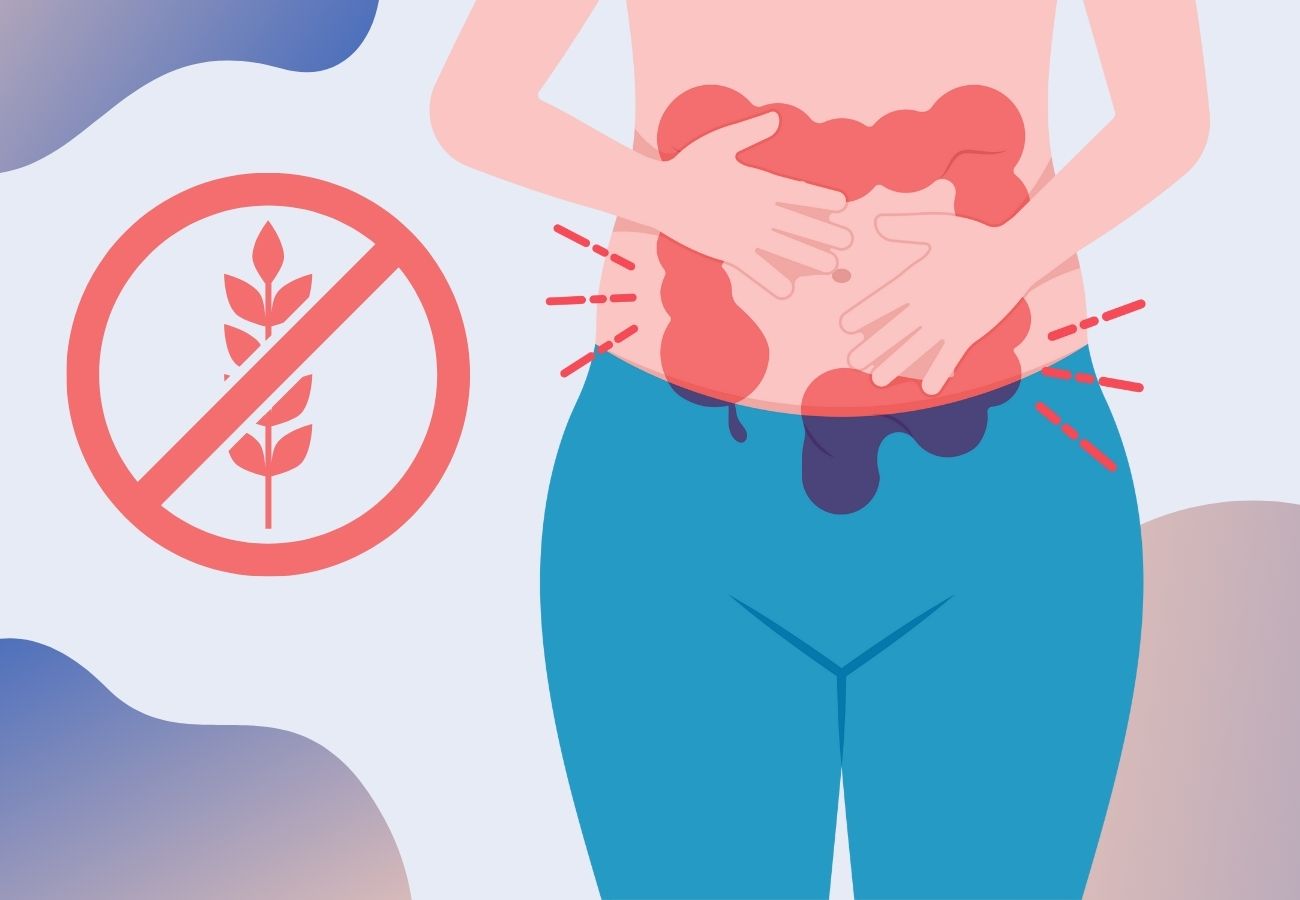Celiac disease is a lifelong, genetically inherited autoimmune disorder that causes the body to attack itself, damaging the lining of the small intestine and preventing proper absorption of nutrients. Don’t fall into the confusion trap: celiac disease and gluten intolerance are not the same thing. Despite the common mix-up, understanding their differences is important since the severity and long-term impacts of these conditions can differ significantly.
Gluten sensitivity or intolerance is a disorder where your body reacts badly to eating gluten, the protein found in wheat, rye, and barley. For those affected, even a small amount of gluten can trigger a range of uncomfortable symptoms like bloating, gas, constipation, abdominal pain, fatigue, headaches, nausea, diarrhea, or a debilitating lack of energy.
How Does Celiac Affect Your Health?
So what sets celiac disease apart and how does it impact your body? People with celiac disease are likewise triggered by gluten and when they eat it, their immune system starts attacking their own body, particularly the lining of the small intestine. This is where your body extracts and absorbs nutrients from everything you eat. When its lining is under attack, it can’t do its job, leading to all sorts of health issues from malnutrition to digestive discomfort.
Parents, siblings, and children of those with celiac disease are at a higher risk for developing it. And it doesn’t stop there. If you have another autoimmune condition like Type 1 diabetes, thyroid issues, or autoimmune liver disease, your chances of having celiac disease also go up. The timing of when infants are introduced to gluten could potentially make a difference too. Studies suggest that easing in small amounts of gluten into a baby’s diet might actually help lower their risk of developing celiac disease by the time they hit their toddler years.
What Are the Symptoms of Celiac Disease?
When your small intestines take a hit from celiac disease, absorbing nutrients becomes a big challenge. These symptoms may initially resemble gluten intolerance, but due to its autoimmune nature, celiac disease often leads to more severe and widespread issues. Here’s what these symptoms can look like.
Digestive Hassels
Imagine this: you finish a meal, but instead of feeling satisfied, you’re left with abdominal pain, bloating, and gas. For people with celiac disease, this is just another day in the life. Their small intestine can’t properly absorb food, leading to a host of digestive troubles. One minute, it’s diarrhea; the next, it’s constipation. These symptoms stem from the body’s struggle to process and eliminate food without the normal functioning of the small intestine—which can majorly disrupt everyday life.
Weight Loss and Malnutrition
The damage to the intestine from celiac disease throws a wrench in how nutrients are absorbed. People might start dropping weight unexpectedly and run into issues like anemia and a lack of essential vitamins and minerals. It’s like your body is missing out on the fuel it needs to run smoothly all because it can’t grab the good stuff from the food you eat.
Fatigue
In celiac disease, the absorption of vital nutrients such as iron, vitamin D, folate, and B12 is often impaired. This nutrient deficiency can sap your energy and cause fatigue as iron is essential for oxygen transport in blood and B and D vitamins are key players in maintaining overall energy levels. Moreover, when gluten triggers a chronic inflammatory response in those with celiac disease, it forces the body to redirect energy towards boosting the immune system and repairing tissue instead of powering through daily activities. This diversion adds to an overall feeling of fatigue, making it harder to get through the day.
Dermatitis
Dermatitis—an itchy, blistering skin rash—occurs when gluten is consumed, causing the immune system to produce the antibody Immunoglobulin A (IgA). These IgA antibodies mistakenly accumulate in the skin, especially around the tiny blood vessels. This causes a full-blown immune response that attracts neutrophils, a type of inflammatory cell. Their arrival kicks off inflammation, leading to an intense dermatitis rash.
Bone or Joint Pain
Deficiencies in Vitamin D and calcium can result in weakened bones, increased fracture risk, and conditions like osteoporosis. Additionally, chronic inflammatory responses can mess with your skeletal system, leading to arthritis-like aches and pains and even issues with bone remodeling. And because celiac is autoimmune in nature, it might even take a direct shot at your joints and bones, ramping up the pain and discomfort.
Dental Defects
Vitamin B12, Folate, Calcium, and Vitamin D are essential for oral health. Without them, you have a higher chance of mouth sores or ulcers, making every sip or bite painful. Some experts think that the antibodies your body creates to fight celiac disease might accidentally attack the proteins that make up your tooth enamel. This can lead to teeth with grooves, pitting, or even a sort of translucent look.
Neurological Issues
Deficiencies in essential vitamins can wreak havoc on your nerve health and brain function, leading to symptoms like numbness, tingling, memory issues, and trouble concentrating. If you’re low on iron, you might face anemia, which cuts down the oxygen supply to your brain, triggering headaches and cognitive struggles. Moreover, during active celiac disease, your body’s inflammatory cytokines spike, potentially dulling brain function and leaving you with that frustrating “brain fog” or mental sluggishness.
Reproductive Problems
Celiac disease significantly impacts reproductive health in both women and men due to nutrient malabsorption and chronic inflammation. Women may face menstrual issues like delayed, absent, or irregular periods. They may also have an increased risk of infertility, miscarriages, preterm birth, and low birth weight babies. For men, celiac disease can affect fertility by hindering the absorption of nutrients essential for sperm health, such as zinc, folate, and selenium. Celiac can also reduce testosterone levels because of the ongoing effects of malnutrition and chronic health challenges.
What Foods Should You Avoid?
What’s the best way to trigger your celiac disease? Obviously, eating foods with gluten. To manage this condition effectively, adopting a strict gluten-free diet is crucial. Here are some foods to steer clear of if you’re gluten intolerant:

- Bread: Rye, barley, whole grain, 9-seed, and white bread are major challenges for anyone with celiac. Choose breads that are specifically labeled gluten-free to ensure they’re safe for consumption.
- Flour Tortillas: Skip the tortilla, save the calories, and protect your intestines because flour tortillas is also a no-go.
- Pasta: Macaroni, rigatoni, fettuccine, gnocchi, spaghetti, whole wheat pasta, and refined white pasta all contain gluten. Luckily, gluten-free pasta is an option that’s widely available nowadays.
- Beer: Most traditional beers are brewed from barley, wheat, or rye, which contain gluten. However, there are “gluten-removed” or “gluten-reduced” beers that are processed to lower gluten levels, which may be tolerated by those with gluten sensitivity.
- Soup: Many soups are thickened with starch or flour, so ask about the ingredients before you order.
- Baked Goods: Most decadent desserts contain gluten, which can cause significant discomfort if you have a gluten sensitivity. Look for baked goods made with alternative flours like buckwheat, corn, millet, quinoa, and rice.
- Oats: While oats are gluten-free, most are processed in plants where gluten grains are all over the plants and might cross-contaminate. Make sure to check the label for this.
Living Well with Celiac Disease
Living with celiac disease certainly has its challenges, but it doesn’t have to dominate your life. The surge in popularity of gluten-free diets has sparked significant advancements in gluten-free food options. And increasing global awareness of the condition is empowering us to manage the condition more effectively. With the right tools, knowledge, and support from a knowledgeable primary care doctor, navigating life with celiac disease is becoming increasingly manageable, allowing those affected to lead full and vibrant lives.
